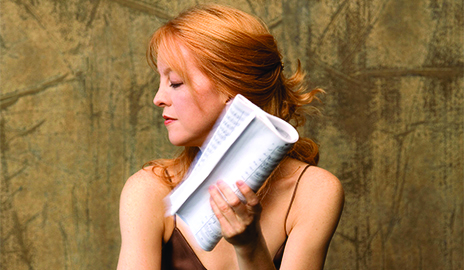
Courtesy of Maria Schneider Orchestra
While most students leave the Elm City for spring break, a group of world-renowned jazz musicians will be making their way to Yale.
“Jazz: A Celebration of America’s Sound” will be hosted from March 10–11 and features Pulitzer Prize winner for music Wynton Marsalis, clarinetist-saxophonist Anat Cohen and the five-time Grammy Award winning Maria Schneider Orchestra. Marsalis, the artistic director of Jazz at Lincoln Center, will also offer a master class during the festival. The Yale Jazz Ensemble, a 17-piece big band, will join the artists in the festival’s performances.
“This festival is bringing today’s top jazz artists to New Haven — the birthplace of Artie Shaw and the stomping grounds of Glenn Miller, Benny Goodman, Wayne Escoffery, Dwike Mitchell and Yale’s own Willie Ruff ’53 MUS ’54,” co-organizer Thomas Duffy said. “Students and community members will have the chance to work with and hear the women and men who are defining the sound of contemporary jazz.”
The festival marks the third of a series of cultural events held this year at the Schwarzman Center, after “Food Conversations” and “Blackstar Rising & The Purple Reign.”
Duffy, an adjunct music professor and the director of University bands, said the choice of a jazz music festival, combined with the previous two events, reflects the “potent mix of programming” that will be expected when the Schwarzman Center re-opens in 2020 after its renovation.
Thomas Hagen ’20, a member of an undergraduate jazz combo, said that he expects the student body to respond enthusiastically to the selection of artists and to continue participating in the campus jazz scene. Similarly, Hersh Gupta ’20, a member of the Yale Jazz Ensemble, said he is excited for the event and that it is a good indicator of a positive future for Yale’s jazz scene.
“This festival is as packed with talent as any 21st-century jazz listener could ever hope for,” Hagen said. “It is sincerely astonishing that our campus is able to host even one of these world-famous performers, let alone all three.”
Colum O’Connor ’18, president of the Yale Undergraduate Jazz Collective, said such a high caliber of musicianship would be incredibly difficult to bring to campus if not through the official channel of the University.
Still, O’Connor said he is surprised that administrators did not consult with students in Yale’s jazz community on the organization of these activities. He added that he is also disappointed the event will be held during spring break. On the day Marsalis, the lineup’s most notable artist, will be performing, he said, most of the students will have already left campus.
Hagen said that although most students will not be motivated to stay on campus for the music, he hopes festival organizers see the value in making the festival more prominent and accessible in the future, given that jazz enthusiasts view the festival as an effort to bolster Yale’s jazz community.
“Music is a form of communication. [Communication is] ultimately how music is going to thrive,” Gupta said. “The [Yale jazz] community has the potential to really grow into something.”
Gupta said he is especially excited for Marsalis’ workshop during the festival, as he fondly recalls memories of competing in the annual jazz festival at Lincoln Center each year in high school. Gupta added that he appreciates Marsalis’ passion for jazz education and hopes his presence will inspire a large turnout from students and the broader New Haven community.
While this is not the first jazz festival hosted by the University, the last one was held more than three decades ago, in the 1980s. According to Duffy, who participated in the production of the first two Yale Annual Jazz Festivals, the roster at that time included Dizzy Gillespie, Toshiko Akiyoshi’s big band and Gerry Mulligan. Back then, Duffy said, the Yale Jazz Ensemble served as a warmup.
All of the festival’s events are free, but attendees are required to secure tickets online in advance.







